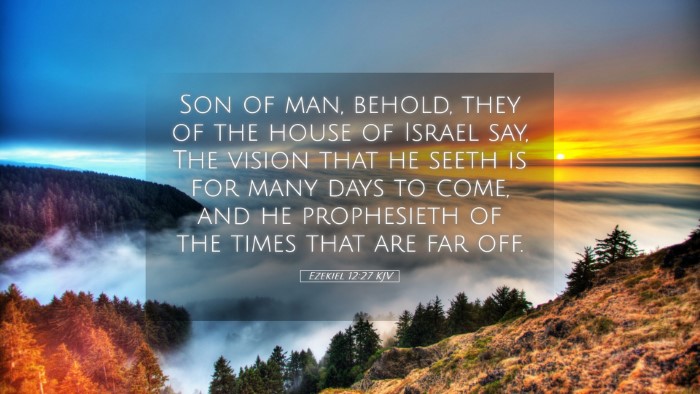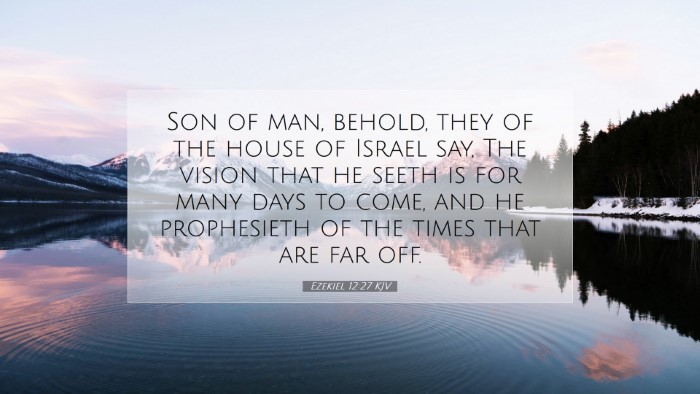Bible Commentary on Ezekiel 12:27
Verse Reference: Ezekiel 12:27
Text: "Son of man, behold, they of the house of Israel say, The vision that he seeth is for many days to come, and he prophesieth of the times that are far off."
Introduction
This verse occurs in a significant context within the prophetic ministry of Ezekiel. Throughout the book, the prophet conveys messages from God regarding judgment, restoration, and the ultimate hope for Israel. Ezekiel's role as a watchman and messenger is crucial, and this verse highlights the people's perception of his prophecies.
Contextual Analysis
Ezekiel is addressing a skeptical audience—the house of Israel, who dismisses his prophecies as distant and irrelevant. This skepticism reflects their desire to continue in their ways without the burden of immediate repentance or change.
Henry notes that, "Men love to hear of things that are far off, provided they are not called to answer for the day which they shall have to face." This insight underscores a common human tendency to procrastinate in matters of faith and obedience.
Commentary Insights
Matthew Henry's Commentary
Matthew Henry emphasizes the slight perceptions of the Israelites toward God’s message, suggesting their deadly indifference. They viewed Ezekiel’s visions as merely future speculations that did not require immediate attention or response. Henry cautions against this viewpoint, as it leads to spiritual complacency and the neglect of God’s imminent call.
Albert Barnes' Commentary
Albert Barnes articulates that the people of Israel were cynical regarding the timing of Ezekiel's visions. They thought the prophecies were distant futures and therefore had little urgency. Barnes points out that this attitude reflected a lack of understanding about the nature of God's judgments, which often manifest in both immediate and far-reaching consequences. He warns that such dismissiveness could lead one to falter in faith, as it causes one to neglect the present call to repentance.
Adam Clarke's Commentary
Adam Clarke further examines the implications of the phrase "many days to come." He elaborates that the people were misunderstanding the prophetic timeline, viewing the divine warnings with skepticism and failure to recognize their present significance. Clarke stresses the importance of recognizing that God's timing is not always aligned with human expectations. He highlights that every prophecy, regardless of its timeline, holds a weight of significance that demands attention.
Theological Reflections
This verse invites reflection on the way God's word is received and interpreted by the faithful and the unfaithful alike. It challenges readers to consider their personal responses to God's warnings and calls.
- Resistance to Prophetic Voices: Just as the Israelites resisted Ezekiel, modern believers can likewise ignore or dismiss God's messengers, particularly when the message calls for uncomfortable change.
- The Nature of Prophecy: Prophetic words often carry both immediate and long-term implications. This verse serves as a reminder that God's words are intended for today, not just for an uncertain future.
- The Urgency of Repentance: The passage reminds ministers and theologians to convey the urgency of God's call to repentance. Today’s proclamations must reflect the immediacy of God’s messages.
Conclusion
Ezekiel 12:27 stands as a poignant reminder to both the ancient Israelites and modern believers about the serious implications of God’s prophetic message. As church leaders and scholars, there is a call to grasp the urgency of God’s words and to communicate them faithfully to their communities.
Engaging with God’s message in a timely manner demands sensitivity to the Spirit and an acknowledgment of the nature of divine prophecy, which calls all to immediate responsiveness rather than deferral. The lessons drawn from this passage remain pertinent in our ongoing discipleship and witness to the world.


